Analyzing the Impact of the National Curriculum on Primary Teachers
VerifiedAdded on 2022/12/26
|10
|2535
|1
Essay
AI Summary
This essay delves into the National Curriculum, examining its influence on primary teachers in England. Introduced in 1988, the curriculum aimed for nationwide uniformity in content and standards. The essay explores the curriculum's impact on subjects taught, professional standards, and the benefits for both teachers and students. It discusses the introduction of new test policies, the provision of essential knowledge, and the curriculum's role in shaping values and ethics. The essay further analyzes the curriculum's structure, aims, and advantages, as well as its limitations, such as constraints on creativity and the pressure on teachers. It also explores future predictions for the National Curriculum, including changes in teaching methods, a focus on learner-centric activities, and the integration of social science. The impact of changes on children's overall development, subject experts, school structures, talent nurturing, literacy rates, student migration, and skill development are also examined. In conclusion, the essay highlights the National Curriculum's role in standardizing assessments and its ongoing evolution to meet educational needs.

Curriculum Studies
Paraphrase This Document
Need a fresh take? Get an instant paraphrase of this document with our AI Paraphraser
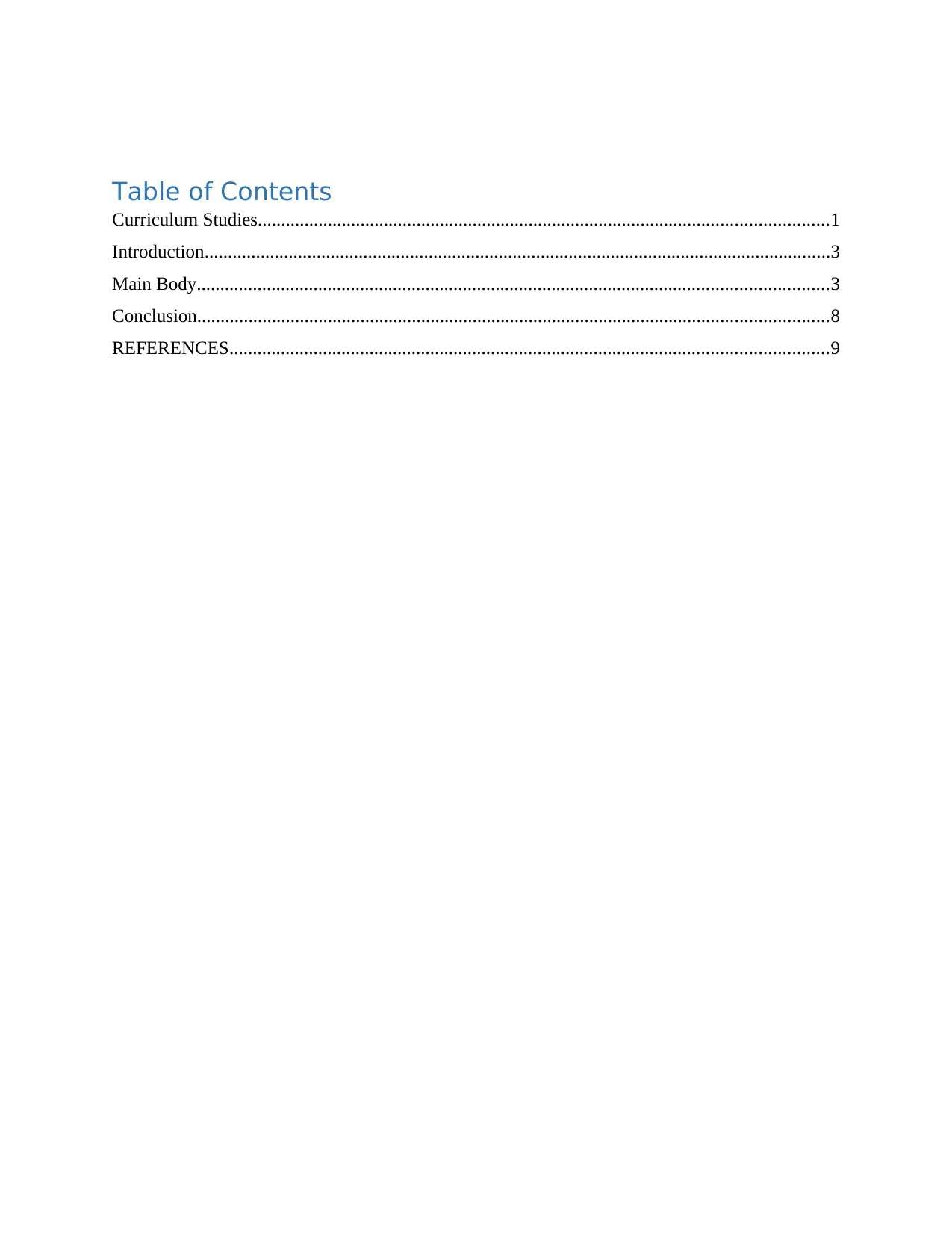
Table of Contents
Curriculum Studies..........................................................................................................................1
Introduction......................................................................................................................................3
Main Body.......................................................................................................................................3
Conclusion.......................................................................................................................................8
REFERENCES................................................................................................................................9
Curriculum Studies..........................................................................................................................1
Introduction......................................................................................................................................3
Main Body.......................................................................................................................................3
Conclusion.......................................................................................................................................8
REFERENCES................................................................................................................................9
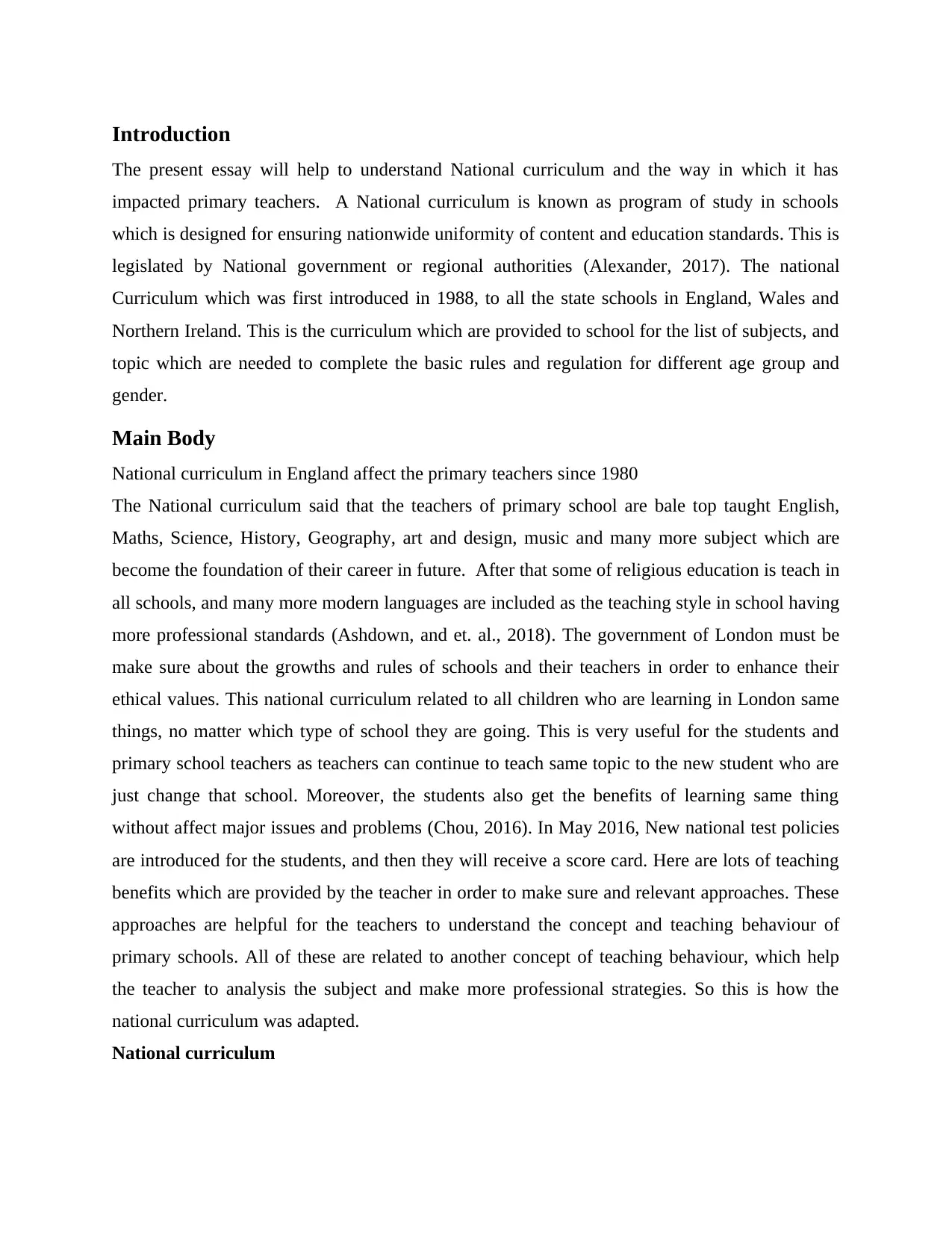
Introduction
The present essay will help to understand National curriculum and the way in which it has
impacted primary teachers. A National curriculum is known as program of study in schools
which is designed for ensuring nationwide uniformity of content and education standards. This is
legislated by National government or regional authorities (Alexander, 2017). The national
Curriculum which was first introduced in 1988, to all the state schools in England, Wales and
Northern Ireland. This is the curriculum which are provided to school for the list of subjects, and
topic which are needed to complete the basic rules and regulation for different age group and
gender.
Main Body
National curriculum in England affect the primary teachers since 1980
The National curriculum said that the teachers of primary school are bale top taught English,
Maths, Science, History, Geography, art and design, music and many more subject which are
become the foundation of their career in future. After that some of religious education is teach in
all schools, and many more modern languages are included as the teaching style in school having
more professional standards (Ashdown, and et. al., 2018). The government of London must be
make sure about the growths and rules of schools and their teachers in order to enhance their
ethical values. This national curriculum related to all children who are learning in London same
things, no matter which type of school they are going. This is very useful for the students and
primary school teachers as teachers can continue to teach same topic to the new student who are
just change that school. Moreover, the students also get the benefits of learning same thing
without affect major issues and problems (Chou, 2016). In May 2016, New national test policies
are introduced for the students, and then they will receive a score card. Here are lots of teaching
benefits which are provided by the teacher in order to make sure and relevant approaches. These
approaches are helpful for the teachers to understand the concept and teaching behaviour of
primary schools. All of these are related to another concept of teaching behaviour, which help
the teacher to analysis the subject and make more professional strategies. So this is how the
national curriculum was adapted.
National curriculum
The present essay will help to understand National curriculum and the way in which it has
impacted primary teachers. A National curriculum is known as program of study in schools
which is designed for ensuring nationwide uniformity of content and education standards. This is
legislated by National government or regional authorities (Alexander, 2017). The national
Curriculum which was first introduced in 1988, to all the state schools in England, Wales and
Northern Ireland. This is the curriculum which are provided to school for the list of subjects, and
topic which are needed to complete the basic rules and regulation for different age group and
gender.
Main Body
National curriculum in England affect the primary teachers since 1980
The National curriculum said that the teachers of primary school are bale top taught English,
Maths, Science, History, Geography, art and design, music and many more subject which are
become the foundation of their career in future. After that some of religious education is teach in
all schools, and many more modern languages are included as the teaching style in school having
more professional standards (Ashdown, and et. al., 2018). The government of London must be
make sure about the growths and rules of schools and their teachers in order to enhance their
ethical values. This national curriculum related to all children who are learning in London same
things, no matter which type of school they are going. This is very useful for the students and
primary school teachers as teachers can continue to teach same topic to the new student who are
just change that school. Moreover, the students also get the benefits of learning same thing
without affect major issues and problems (Chou, 2016). In May 2016, New national test policies
are introduced for the students, and then they will receive a score card. Here are lots of teaching
benefits which are provided by the teacher in order to make sure and relevant approaches. These
approaches are helpful for the teachers to understand the concept and teaching behaviour of
primary schools. All of these are related to another concept of teaching behaviour, which help
the teacher to analysis the subject and make more professional strategies. So this is how the
national curriculum was adapted.
National curriculum
⊘ This is a preview!⊘
Do you want full access?
Subscribe today to unlock all pages.

Trusted by 1+ million students worldwide
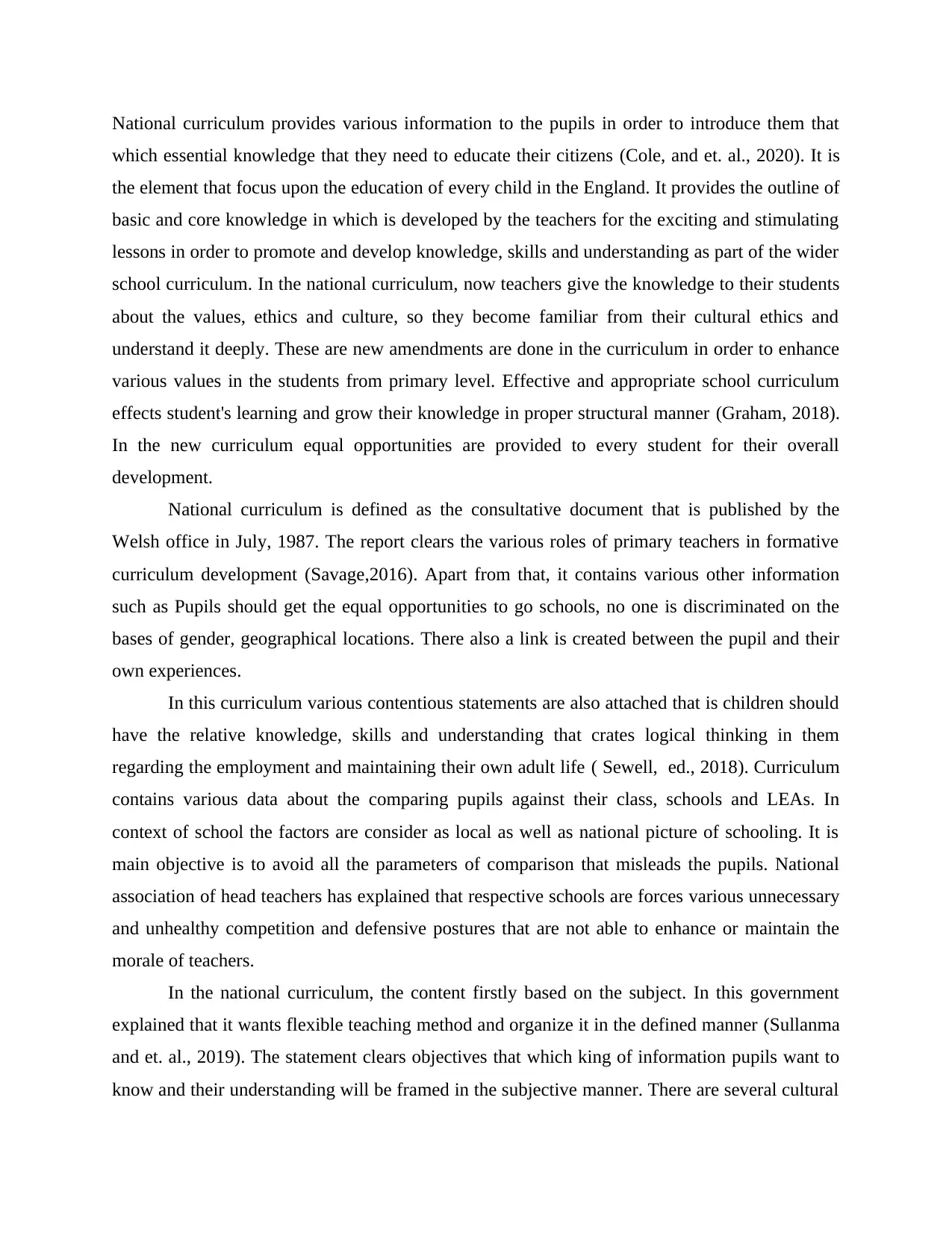
National curriculum provides various information to the pupils in order to introduce them that
which essential knowledge that they need to educate their citizens (Cole, and et. al., 2020). It is
the element that focus upon the education of every child in the England. It provides the outline of
basic and core knowledge in which is developed by the teachers for the exciting and stimulating
lessons in order to promote and develop knowledge, skills and understanding as part of the wider
school curriculum. In the national curriculum, now teachers give the knowledge to their students
about the values, ethics and culture, so they become familiar from their cultural ethics and
understand it deeply. These are new amendments are done in the curriculum in order to enhance
various values in the students from primary level. Effective and appropriate school curriculum
effects student's learning and grow their knowledge in proper structural manner (Graham, 2018).
In the new curriculum equal opportunities are provided to every student for their overall
development.
National curriculum is defined as the consultative document that is published by the
Welsh office in July, 1987. The report clears the various roles of primary teachers in formative
curriculum development (Savage,2016). Apart from that, it contains various other information
such as Pupils should get the equal opportunities to go schools, no one is discriminated on the
bases of gender, geographical locations. There also a link is created between the pupil and their
own experiences.
In this curriculum various contentious statements are also attached that is children should
have the relative knowledge, skills and understanding that crates logical thinking in them
regarding the employment and maintaining their own adult life ( Sewell, ed., 2018). Curriculum
contains various data about the comparing pupils against their class, schools and LEAs. In
context of school the factors are consider as local as well as national picture of schooling. It is
main objective is to avoid all the parameters of comparison that misleads the pupils. National
association of head teachers has explained that respective schools are forces various unnecessary
and unhealthy competition and defensive postures that are not able to enhance or maintain the
morale of teachers.
In the national curriculum, the content firstly based on the subject. In this government
explained that it wants flexible teaching method and organize it in the defined manner (Sullanma
and et. al., 2019). The statement clears objectives that which king of information pupils want to
know and their understanding will be framed in the subjective manner. There are several cultural
which essential knowledge that they need to educate their citizens (Cole, and et. al., 2020). It is
the element that focus upon the education of every child in the England. It provides the outline of
basic and core knowledge in which is developed by the teachers for the exciting and stimulating
lessons in order to promote and develop knowledge, skills and understanding as part of the wider
school curriculum. In the national curriculum, now teachers give the knowledge to their students
about the values, ethics and culture, so they become familiar from their cultural ethics and
understand it deeply. These are new amendments are done in the curriculum in order to enhance
various values in the students from primary level. Effective and appropriate school curriculum
effects student's learning and grow their knowledge in proper structural manner (Graham, 2018).
In the new curriculum equal opportunities are provided to every student for their overall
development.
National curriculum is defined as the consultative document that is published by the
Welsh office in July, 1987. The report clears the various roles of primary teachers in formative
curriculum development (Savage,2016). Apart from that, it contains various other information
such as Pupils should get the equal opportunities to go schools, no one is discriminated on the
bases of gender, geographical locations. There also a link is created between the pupil and their
own experiences.
In this curriculum various contentious statements are also attached that is children should
have the relative knowledge, skills and understanding that crates logical thinking in them
regarding the employment and maintaining their own adult life ( Sewell, ed., 2018). Curriculum
contains various data about the comparing pupils against their class, schools and LEAs. In
context of school the factors are consider as local as well as national picture of schooling. It is
main objective is to avoid all the parameters of comparison that misleads the pupils. National
association of head teachers has explained that respective schools are forces various unnecessary
and unhealthy competition and defensive postures that are not able to enhance or maintain the
morale of teachers.
In the national curriculum, the content firstly based on the subject. In this government
explained that it wants flexible teaching method and organize it in the defined manner (Sullanma
and et. al., 2019). The statement clears objectives that which king of information pupils want to
know and their understanding will be framed in the subjective manner. There are several cultural
Paraphrase This Document
Need a fresh take? Get an instant paraphrase of this document with our AI Paraphraser
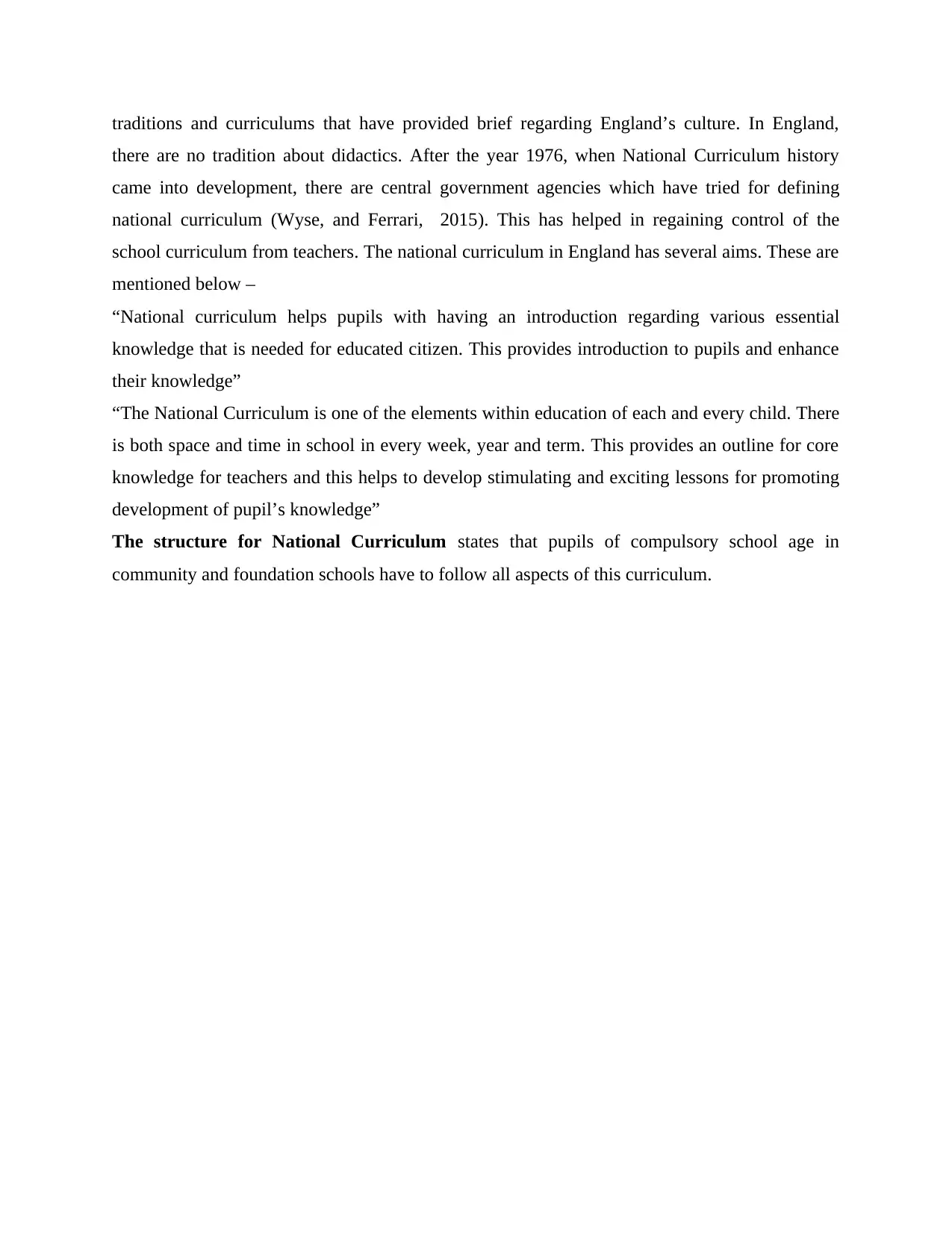
traditions and curriculums that have provided brief regarding England’s culture. In England,
there are no tradition about didactics. After the year 1976, when National Curriculum history
came into development, there are central government agencies which have tried for defining
national curriculum (Wyse, and Ferrari, 2015). This has helped in regaining control of the
school curriculum from teachers. The national curriculum in England has several aims. These are
mentioned below –
“National curriculum helps pupils with having an introduction regarding various essential
knowledge that is needed for educated citizen. This provides introduction to pupils and enhance
their knowledge”
“The National Curriculum is one of the elements within education of each and every child. There
is both space and time in school in every week, year and term. This provides an outline for core
knowledge for teachers and this helps to develop stimulating and exciting lessons for promoting
development of pupil’s knowledge”
The structure for National Curriculum states that pupils of compulsory school age in
community and foundation schools have to follow all aspects of this curriculum.
there are no tradition about didactics. After the year 1976, when National Curriculum history
came into development, there are central government agencies which have tried for defining
national curriculum (Wyse, and Ferrari, 2015). This has helped in regaining control of the
school curriculum from teachers. The national curriculum in England has several aims. These are
mentioned below –
“National curriculum helps pupils with having an introduction regarding various essential
knowledge that is needed for educated citizen. This provides introduction to pupils and enhance
their knowledge”
“The National Curriculum is one of the elements within education of each and every child. There
is both space and time in school in every week, year and term. This provides an outline for core
knowledge for teachers and this helps to develop stimulating and exciting lessons for promoting
development of pupil’s knowledge”
The structure for National Curriculum states that pupils of compulsory school age in
community and foundation schools have to follow all aspects of this curriculum.
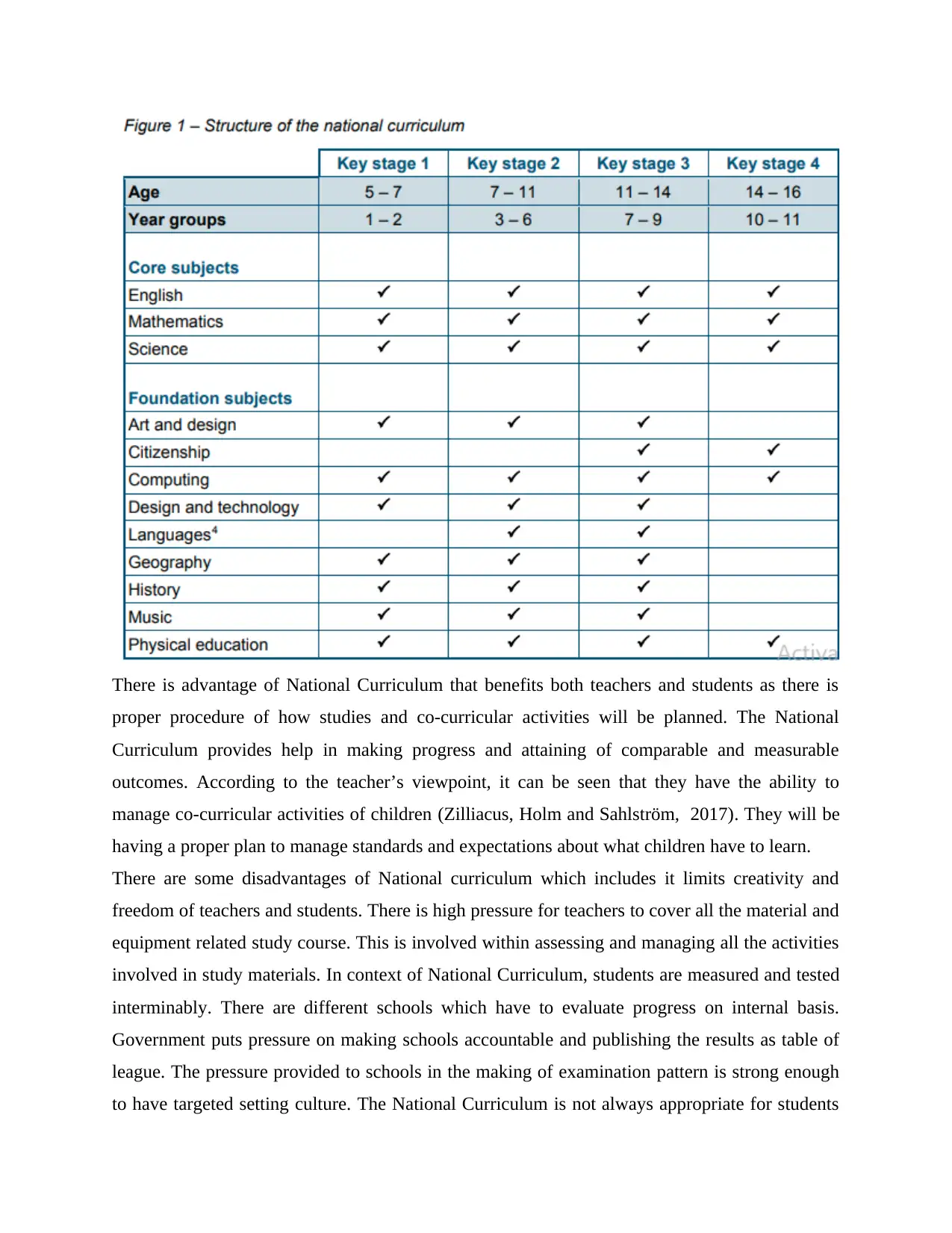
There is advantage of National Curriculum that benefits both teachers and students as there is
proper procedure of how studies and co-curricular activities will be planned. The National
Curriculum provides help in making progress and attaining of comparable and measurable
outcomes. According to the teacher’s viewpoint, it can be seen that they have the ability to
manage co-curricular activities of children (Zilliacus, Holm and Sahlström, 2017). They will be
having a proper plan to manage standards and expectations about what children have to learn.
There are some disadvantages of National curriculum which includes it limits creativity and
freedom of teachers and students. There is high pressure for teachers to cover all the material and
equipment related study course. This is involved within assessing and managing all the activities
involved in study materials. In context of National Curriculum, students are measured and tested
interminably. There are different schools which have to evaluate progress on internal basis.
Government puts pressure on making schools accountable and publishing the results as table of
league. The pressure provided to schools in the making of examination pattern is strong enough
to have targeted setting culture. The National Curriculum is not always appropriate for students
proper procedure of how studies and co-curricular activities will be planned. The National
Curriculum provides help in making progress and attaining of comparable and measurable
outcomes. According to the teacher’s viewpoint, it can be seen that they have the ability to
manage co-curricular activities of children (Zilliacus, Holm and Sahlström, 2017). They will be
having a proper plan to manage standards and expectations about what children have to learn.
There are some disadvantages of National curriculum which includes it limits creativity and
freedom of teachers and students. There is high pressure for teachers to cover all the material and
equipment related study course. This is involved within assessing and managing all the activities
involved in study materials. In context of National Curriculum, students are measured and tested
interminably. There are different schools which have to evaluate progress on internal basis.
Government puts pressure on making schools accountable and publishing the results as table of
league. The pressure provided to schools in the making of examination pattern is strong enough
to have targeted setting culture. The National Curriculum is not always appropriate for students
⊘ This is a preview!⊘
Do you want full access?
Subscribe today to unlock all pages.

Trusted by 1+ million students worldwide
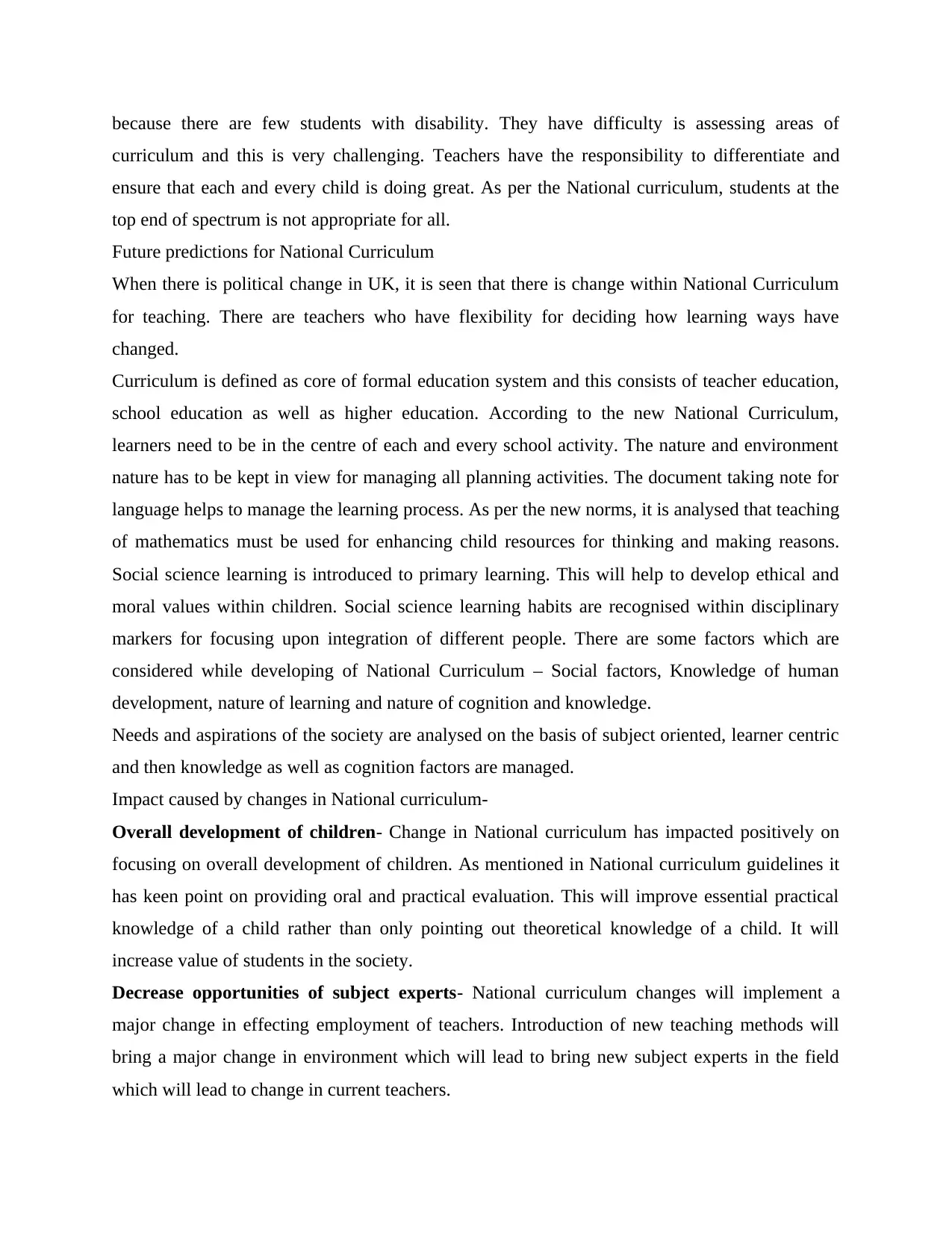
because there are few students with disability. They have difficulty is assessing areas of
curriculum and this is very challenging. Teachers have the responsibility to differentiate and
ensure that each and every child is doing great. As per the National curriculum, students at the
top end of spectrum is not appropriate for all.
Future predictions for National Curriculum
When there is political change in UK, it is seen that there is change within National Curriculum
for teaching. There are teachers who have flexibility for deciding how learning ways have
changed.
Curriculum is defined as core of formal education system and this consists of teacher education,
school education as well as higher education. According to the new National Curriculum,
learners need to be in the centre of each and every school activity. The nature and environment
nature has to be kept in view for managing all planning activities. The document taking note for
language helps to manage the learning process. As per the new norms, it is analysed that teaching
of mathematics must be used for enhancing child resources for thinking and making reasons.
Social science learning is introduced to primary learning. This will help to develop ethical and
moral values within children. Social science learning habits are recognised within disciplinary
markers for focusing upon integration of different people. There are some factors which are
considered while developing of National Curriculum – Social factors, Knowledge of human
development, nature of learning and nature of cognition and knowledge.
Needs and aspirations of the society are analysed on the basis of subject oriented, learner centric
and then knowledge as well as cognition factors are managed.
Impact caused by changes in National curriculum-
Overall development of children- Change in National curriculum has impacted positively on
focusing on overall development of children. As mentioned in National curriculum guidelines it
has keen point on providing oral and practical evaluation. This will improve essential practical
knowledge of a child rather than only pointing out theoretical knowledge of a child. It will
increase value of students in the society.
Decrease opportunities of subject experts- National curriculum changes will implement a
major change in effecting employment of teachers. Introduction of new teaching methods will
bring a major change in environment which will lead to bring new subject experts in the field
which will lead to change in current teachers.
curriculum and this is very challenging. Teachers have the responsibility to differentiate and
ensure that each and every child is doing great. As per the National curriculum, students at the
top end of spectrum is not appropriate for all.
Future predictions for National Curriculum
When there is political change in UK, it is seen that there is change within National Curriculum
for teaching. There are teachers who have flexibility for deciding how learning ways have
changed.
Curriculum is defined as core of formal education system and this consists of teacher education,
school education as well as higher education. According to the new National Curriculum,
learners need to be in the centre of each and every school activity. The nature and environment
nature has to be kept in view for managing all planning activities. The document taking note for
language helps to manage the learning process. As per the new norms, it is analysed that teaching
of mathematics must be used for enhancing child resources for thinking and making reasons.
Social science learning is introduced to primary learning. This will help to develop ethical and
moral values within children. Social science learning habits are recognised within disciplinary
markers for focusing upon integration of different people. There are some factors which are
considered while developing of National Curriculum – Social factors, Knowledge of human
development, nature of learning and nature of cognition and knowledge.
Needs and aspirations of the society are analysed on the basis of subject oriented, learner centric
and then knowledge as well as cognition factors are managed.
Impact caused by changes in National curriculum-
Overall development of children- Change in National curriculum has impacted positively on
focusing on overall development of children. As mentioned in National curriculum guidelines it
has keen point on providing oral and practical evaluation. This will improve essential practical
knowledge of a child rather than only pointing out theoretical knowledge of a child. It will
increase value of students in the society.
Decrease opportunities of subject experts- National curriculum changes will implement a
major change in effecting employment of teachers. Introduction of new teaching methods will
bring a major change in environment which will lead to bring new subject experts in the field
which will lead to change in current teachers.
Paraphrase This Document
Need a fresh take? Get an instant paraphrase of this document with our AI Paraphraser
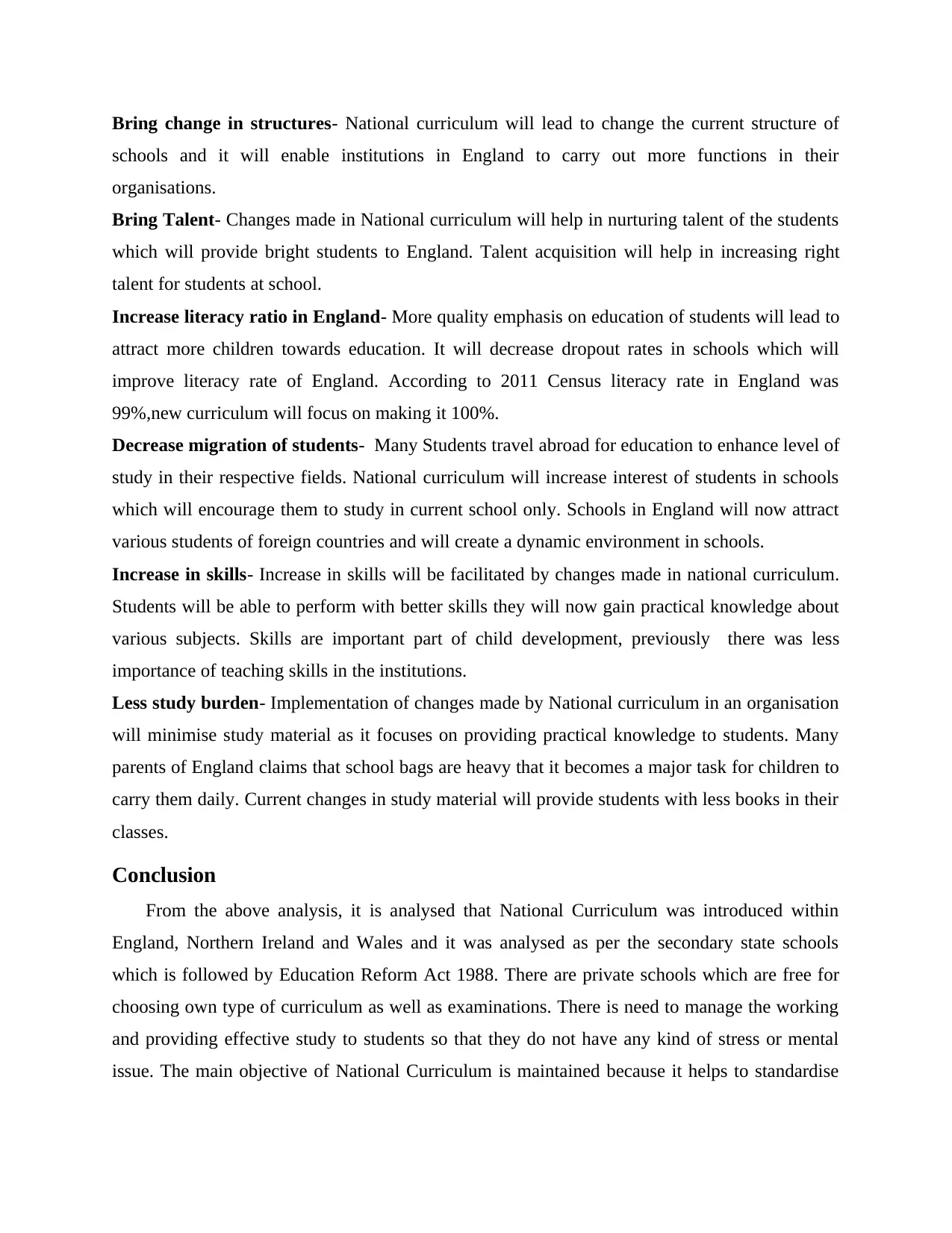
Bring change in structures- National curriculum will lead to change the current structure of
schools and it will enable institutions in England to carry out more functions in their
organisations.
Bring Talent- Changes made in National curriculum will help in nurturing talent of the students
which will provide bright students to England. Talent acquisition will help in increasing right
talent for students at school.
Increase literacy ratio in England- More quality emphasis on education of students will lead to
attract more children towards education. It will decrease dropout rates in schools which will
improve literacy rate of England. According to 2011 Census literacy rate in England was
99%,new curriculum will focus on making it 100%.
Decrease migration of students- Many Students travel abroad for education to enhance level of
study in their respective fields. National curriculum will increase interest of students in schools
which will encourage them to study in current school only. Schools in England will now attract
various students of foreign countries and will create a dynamic environment in schools.
Increase in skills- Increase in skills will be facilitated by changes made in national curriculum.
Students will be able to perform with better skills they will now gain practical knowledge about
various subjects. Skills are important part of child development, previously there was less
importance of teaching skills in the institutions.
Less study burden- Implementation of changes made by National curriculum in an organisation
will minimise study material as it focuses on providing practical knowledge to students. Many
parents of England claims that school bags are heavy that it becomes a major task for children to
carry them daily. Current changes in study material will provide students with less books in their
classes.
Conclusion
From the above analysis, it is analysed that National Curriculum was introduced within
England, Northern Ireland and Wales and it was analysed as per the secondary state schools
which is followed by Education Reform Act 1988. There are private schools which are free for
choosing own type of curriculum as well as examinations. There is need to manage the working
and providing effective study to students so that they do not have any kind of stress or mental
issue. The main objective of National Curriculum is maintained because it helps to standardise
schools and it will enable institutions in England to carry out more functions in their
organisations.
Bring Talent- Changes made in National curriculum will help in nurturing talent of the students
which will provide bright students to England. Talent acquisition will help in increasing right
talent for students at school.
Increase literacy ratio in England- More quality emphasis on education of students will lead to
attract more children towards education. It will decrease dropout rates in schools which will
improve literacy rate of England. According to 2011 Census literacy rate in England was
99%,new curriculum will focus on making it 100%.
Decrease migration of students- Many Students travel abroad for education to enhance level of
study in their respective fields. National curriculum will increase interest of students in schools
which will encourage them to study in current school only. Schools in England will now attract
various students of foreign countries and will create a dynamic environment in schools.
Increase in skills- Increase in skills will be facilitated by changes made in national curriculum.
Students will be able to perform with better skills they will now gain practical knowledge about
various subjects. Skills are important part of child development, previously there was less
importance of teaching skills in the institutions.
Less study burden- Implementation of changes made by National curriculum in an organisation
will minimise study material as it focuses on providing practical knowledge to students. Many
parents of England claims that school bags are heavy that it becomes a major task for children to
carry them daily. Current changes in study material will provide students with less books in their
classes.
Conclusion
From the above analysis, it is analysed that National Curriculum was introduced within
England, Northern Ireland and Wales and it was analysed as per the secondary state schools
which is followed by Education Reform Act 1988. There are private schools which are free for
choosing own type of curriculum as well as examinations. There is need to manage the working
and providing effective study to students so that they do not have any kind of stress or mental
issue. The main objective of National Curriculum is maintained because it helps to standardise

different assessments. These provide help for managing compilation of assessments and
statistics.
statistics.
⊘ This is a preview!⊘
Do you want full access?
Subscribe today to unlock all pages.

Trusted by 1+ million students worldwide
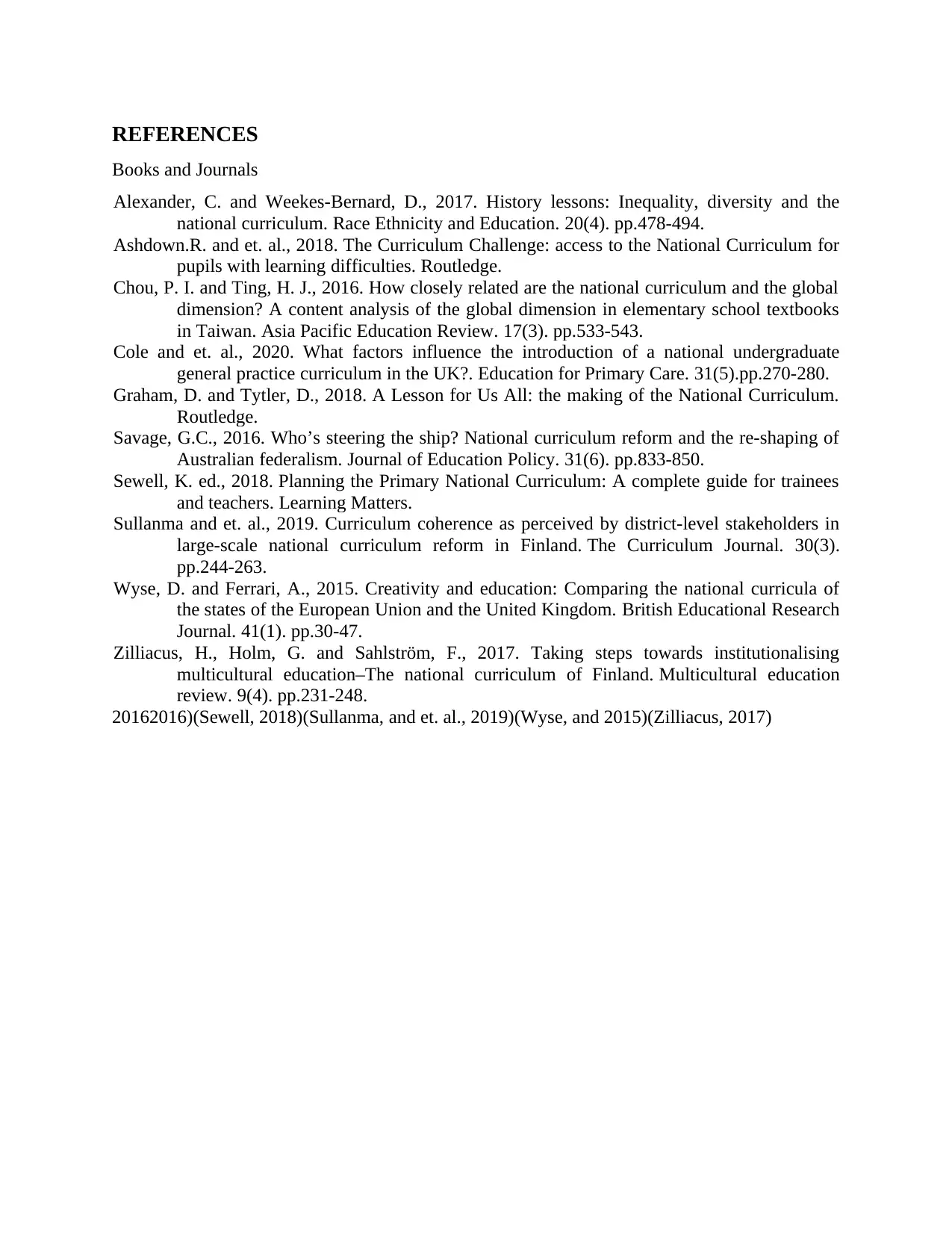
REFERENCES
Books and Journals
Alexander, C. and Weekes-Bernard, D., 2017. History lessons: Inequality, diversity and the
national curriculum. Race Ethnicity and Education. 20(4). pp.478-494.
Ashdown.R. and et. al., 2018. The Curriculum Challenge: access to the National Curriculum for
pupils with learning difficulties. Routledge.
Chou, P. I. and Ting, H. J., 2016. How closely related are the national curriculum and the global
dimension? A content analysis of the global dimension in elementary school textbooks
in Taiwan. Asia Pacific Education Review. 17(3). pp.533-543.
Cole and et. al., 2020. What factors influence the introduction of a national undergraduate
general practice curriculum in the UK?. Education for Primary Care. 31(5).pp.270-280.
Graham, D. and Tytler, D., 2018. A Lesson for Us All: the making of the National Curriculum.
Routledge.
Savage, G.C., 2016. Who’s steering the ship? National curriculum reform and the re-shaping of
Australian federalism. Journal of Education Policy. 31(6). pp.833-850.
Sewell, K. ed., 2018. Planning the Primary National Curriculum: A complete guide for trainees
and teachers. Learning Matters.
Sullanma and et. al., 2019. Curriculum coherence as perceived by district-level stakeholders in
large-scale national curriculum reform in Finland. The Curriculum Journal. 30(3).
pp.244-263.
Wyse, D. and Ferrari, A., 2015. Creativity and education: Comparing the national curricula of
the states of the European Union and the United Kingdom. British Educational Research
Journal. 41(1). pp.30-47.
Zilliacus, H., Holm, G. and Sahlström, F., 2017. Taking steps towards institutionalising
multicultural education–The national curriculum of Finland. Multicultural education
review. 9(4). pp.231-248.
20162016)(Sewell, 2018)(Sullanma, and et. al., 2019)(Wyse, and 2015)(Zilliacus, 2017)
Books and Journals
Alexander, C. and Weekes-Bernard, D., 2017. History lessons: Inequality, diversity and the
national curriculum. Race Ethnicity and Education. 20(4). pp.478-494.
Ashdown.R. and et. al., 2018. The Curriculum Challenge: access to the National Curriculum for
pupils with learning difficulties. Routledge.
Chou, P. I. and Ting, H. J., 2016. How closely related are the national curriculum and the global
dimension? A content analysis of the global dimension in elementary school textbooks
in Taiwan. Asia Pacific Education Review. 17(3). pp.533-543.
Cole and et. al., 2020. What factors influence the introduction of a national undergraduate
general practice curriculum in the UK?. Education for Primary Care. 31(5).pp.270-280.
Graham, D. and Tytler, D., 2018. A Lesson for Us All: the making of the National Curriculum.
Routledge.
Savage, G.C., 2016. Who’s steering the ship? National curriculum reform and the re-shaping of
Australian federalism. Journal of Education Policy. 31(6). pp.833-850.
Sewell, K. ed., 2018. Planning the Primary National Curriculum: A complete guide for trainees
and teachers. Learning Matters.
Sullanma and et. al., 2019. Curriculum coherence as perceived by district-level stakeholders in
large-scale national curriculum reform in Finland. The Curriculum Journal. 30(3).
pp.244-263.
Wyse, D. and Ferrari, A., 2015. Creativity and education: Comparing the national curricula of
the states of the European Union and the United Kingdom. British Educational Research
Journal. 41(1). pp.30-47.
Zilliacus, H., Holm, G. and Sahlström, F., 2017. Taking steps towards institutionalising
multicultural education–The national curriculum of Finland. Multicultural education
review. 9(4). pp.231-248.
20162016)(Sewell, 2018)(Sullanma, and et. al., 2019)(Wyse, and 2015)(Zilliacus, 2017)
1 out of 10
Related Documents
Your All-in-One AI-Powered Toolkit for Academic Success.
+13062052269
info@desklib.com
Available 24*7 on WhatsApp / Email
![[object Object]](/_next/static/media/star-bottom.7253800d.svg)
Unlock your academic potential
Copyright © 2020–2026 A2Z Services. All Rights Reserved. Developed and managed by ZUCOL.





